Everything I Learned While Hitchhiking Around Iceland
Rule #1: Always carry treats.
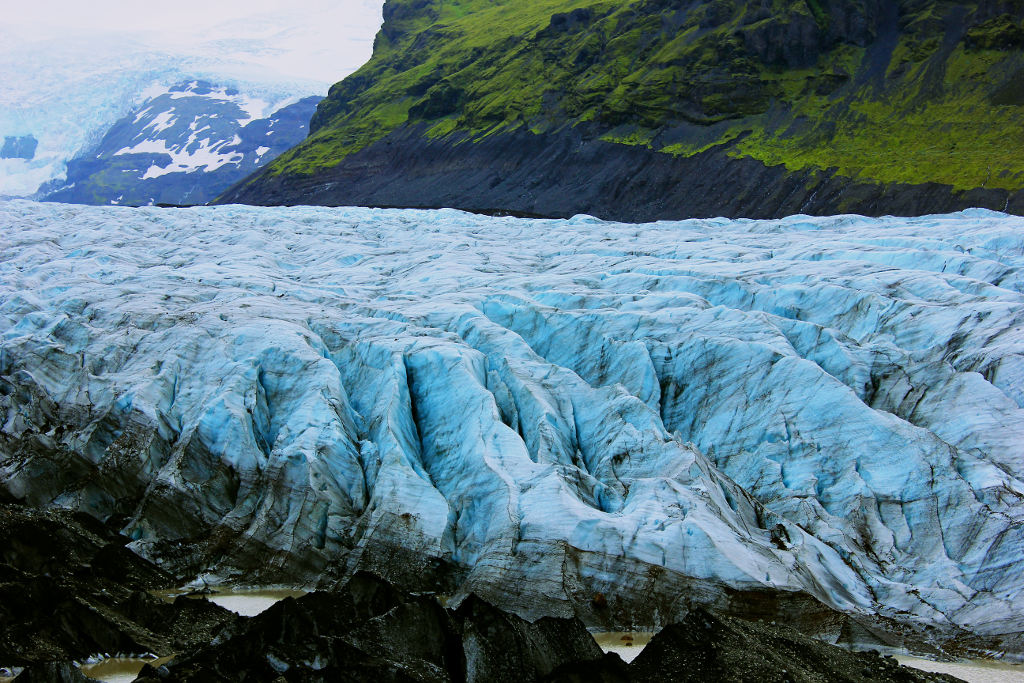
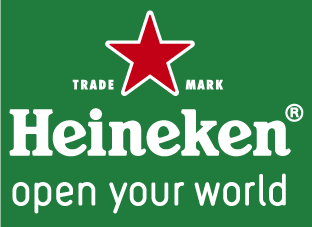
Open Your City with
We’ve teamed up with Heineken to introduce you to some men and women who have chosen to go beyond their borders, challenge the status quo, say ‘why not?’ instead of ‘it can’t be done’ — and as a result have made the world a more interesting place for the rest of us. For more people worth watching, head here.
–
I’m walking in the black gravel looking right into the bright 10pm sun. Iceland’s national ring-road, Road Number 1, reaches out through the lava dessert before me and scratches its way to the horizon.
My boots crunch on, beating out the rhythm as I hum to tune to Thomas the Tank Engine. I must make an effort to learn the words to more songs.
I know I’m perfectly safe: Iceland has one murder perhaps every other year (and they’re usually related to the fledgling urban drug scene, rather than out here). Iceland’s police force has never once in their history fired a single shot at a criminal. People here are nice.
The hum of an engine builds up behind me.
In the last week I’ve learned this ritual, and mastered it: Keep walking. If I turn around I’ll jinx it. Wait thirty seconds or so, until he’s close, and then the thumb goes up. I clutch my cardboard sign against the wind; the driver won’t be able to miss the simple text: “WEST”. West towards Reykjavík, west towards civilisation. But I still don’t stop walking or look back, even as the engine starts to roar.
I’ve realised that my puffy blue down jacket is far more inductive to getting picked up than my billowing brown coat, but there are some things that I can’t disguise: my scruffy beard, my filthy shirt, the stye in my right eye. So I trudge forward and hope.
This is the 309th time I’ve put my thumb up for a ride. 26 cars have stopped for me. I’ve taken a ride with 17 of them. This car slows as he passes me and pulls over in the gravel. Despite my heavy backpack, I run towards it. You need to run, to show that you’re thankful.
HIM: “Where are you going?”
His English is almost perfect. He has that same American twang that all Icelanders under 40 seem to speak with.
ME: “Anywhere towards Reykjavík would be great.”
HIM: “I can take you as far as Hvolsvöllur.”
ME: “Thanks that’s excellent.”
I pretend to know where Hvolsvöllur is. I throw my pack in the back and climb in.
There’s no typical person who picks you up. The only thing you can count on is that it won’t be tourists. Icelanders stop to offer you a ride, tourists splash you with their rental cars.
HIM: “Where have you come from?”
It always starts something like this.
ME: “I was in Vik this morning, and I went to Skógafoss and Þórsmörk.”
My pronunciation of the impossible names sounds as unpleasant as it does uncertain, but he’s used to it.
HIM: “Ah yes, beautiful, don’t you think?”
ME: “It was incredible. This whole place is amazing. It’s just so different to anywhere else I’ve ever been…”
I then proceed to rattle off my list of flattering observations about Iceland’s natural wonder. Of course it is beautiful and incredible and amazing and different. But I’ve had this conversation 30 times. Icelanders are (rightly) proud of their country. And I show my due respect.
HIM: “And did you see the glaciers?”
Icelanders seem to have the same institutionalised affection for their glaciers as Sydneysiders do for the Opera House.
ME: “Oh yes, beautiful.”
I nod along. I’m running out of adjectives. But even if I wanted to go into it, I couldn’t possibly explain to him what it was like to see a glacier for the first time with my own eyes. They’re massive, beyond the possibilities of my own imagination. The top is a sea of white, above everything. From there the ice creeps ever-down into the tongues, where it explodes outwards in infinite shapes and patterns, under the weight of the glacier’s own magnificence.
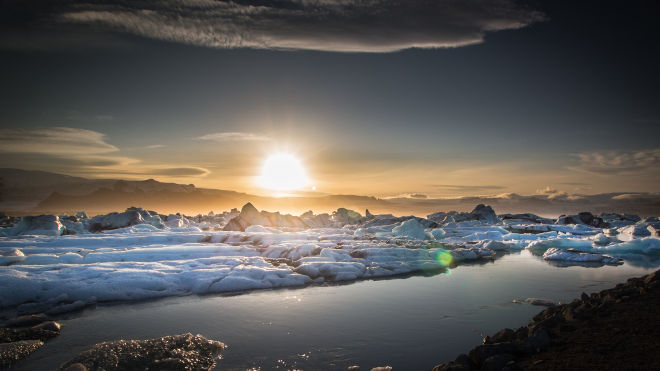
Photo by Clement127, under a Creative Commons license on Flickr
I don’t tell him that I blew my last 12000 Króna on a snowshoeing and ice-climbing tour on one of the glaciers. It was worth every penny, but if I’m here taking his free lift, then I don’t want to seem like I’ve been splashing too much cash.
“Would you like a cookie?”
I reach into my bag and pull out a swaddled packet of chocolate-coated digestive biscuits. I’ve forbidden myself from eating these, no matter how cold or hungry I get: they’re too important. They’re reserved as currency for drivers and can only be consumed in special circumstances.
HIM: “No thanks.”
They always say no first. I eat one.
“Actually, yes, may I?”
There’s no resisting the creamy chocolate and the sweet crunch. I’ve given cash tips to younger guys in worse cars, but it would be weird and patronising to offer this guy money. If we stop I’ll buy him a coffee. In the meantime, this is why the biscuits are so important.
A few moments of silence pass and I know I really have to start paying my way. Most people will pick you up not only out of the warmth of their Icelandic harts, but also because driving on Road Number 1 is terribly boring, and they want to chat. I’m pretty beat, but I should talk.
I glance around the car, looking for a clue.
ME: “Are you coming from work?”
HIM: “Yeah, I finished an hour ago.”
He goes on to tell me that he’s a chef. We talk about it for a while. I’ve spoken to an electrical engineer, a university student, a convenience store clerk, a teacher, a soil scientist, a mechanic, and a farm hand. Sometimes it’s fascinating chatting about work and different industries, and sometimes a job’s just a boring job, no matter where you live.
It’s harder work running the conversation, but it’s worth it. This is what makes hitching really interesting, and why I prefer it to the bus.
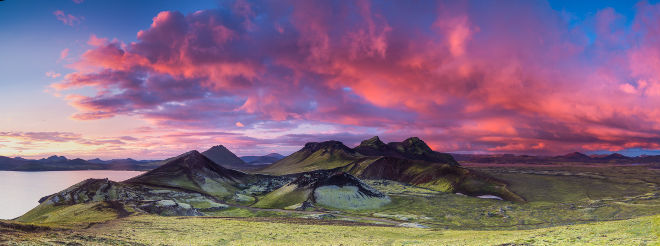
Photo by Lovepro, under a Creative Commons license on Flickr
Conversation slowly turns from work to money, and from money we unavoidably end up at The Collapse.
I hear a new version of the same story.
“I don’t have it so bad as some, but times are tough, yes.”
I’m no economist, and it’s hard to get right to the heart of it. From what I can gather: because of a whole web of global financial problems, domestic corruption and overzealous lending and borrowing, this place has gone completely tits-up. The Icelandic government owes the British something like £2.3 billion. It will try to pay it back with (about 5.5%) interest over the next 15 years. The situation seems not unfairly comparable to that of Germany in the wake of the First World War – and we know where that got everybody.
In addition to the national debt crisis, ordinary Icelanders are totally screwed. The cost of living’s gone up by nearly 20%. Unemployment’s booming. Construction sites are motionless. Taxes keep getting raised.
“It’s good that you tourists are here, but you should pay for the bus.”
He jokes that I should also buy some aluminium and some whale meat while I’m visiting, because apart from tourist attractions that’s all that Iceland actually produces.
ME: “Do you cook it much, for your customers?”
I’ve just finished Moby Dick, and am doubly interested in what Icelanders think about eating whale.
HIM: “We haven’t had it for 15 years or so, so it’s only just come back into the stores. So the young people aren’t used to it. But it’s good meat. Did you try some? …Or are you …whale-friendly?
He’s cautious.
ME: “No, I tried it. It was interesting. I thought it would taste like fish, but it was actually much more like steak …After that I went whale watching though, to balance out the killing with some eco-tourism.”
Now I laugh nervously – a lot of people are very defensive, and I don’t know where he’s going to come down on this one.
HIM: “Yeah, it’s about balance.”
Phew.
Then he peddles the same rhetoric as most of the other Icelanders I’ve met.
“If we save all the whales then they’ll eat all the fish, and we won’t have any food then. We have to manage the oceans. And one whale is one life, yeah? A thousand fish is a thousand lives. So, what’s better to kill?”
We get a bit comfortable with each other. He eats a few more of my biscuits.
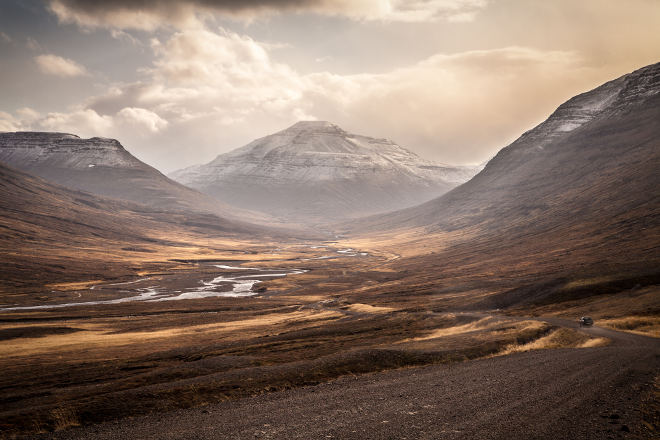
Photo by Adrés Nieto Porras, under a Creative Commons License on Flickr
We chat about the ever-changing weather (a favourite topic of Icelandic conversation). Even though we’re almost in the Arctic Circle, here in the Gulf Stream it’s actually rather mild. It swings between sun and ain and cloud and wind all the time, but the ‘Ice’ is only really in the name. It’s not too cold at all.
He asks me where I’m staying.
This is a question I try to avoid.
ME: “I’ve been mainly in hostels and guesthouses.”
Excellently ambiguous. I don’t want to give the impression I’m blowing lots of cash, but similarly, I don’t want to tell him just how frugal I’ve been in my accommodations.
I’ve spent three nights this week sleeping nowhere in particular. I’ve walked and hitched through the chilliest parts of the night, and then napped during the day. I’ve been to hostels, only intermittently, mainly to wash.
I have loved every minute of being here alone in Iceland. I’ve walked for kilometres with absolutely no destination, taking my cues from streams or peaks. I’ve watched the evening sun acutely descend, skirt along the horizon, then start to slowly rise again, all the while producing a five-hour blazing molten sunset. I’ve slept soundly in the heat of the afternoon lying in a field of wildflowers. I’ve (self-consciously) felt the romance of vagrancy.
Now, I can’t give the impression that I’m a wacko. Explaining that yesterday I climbed up a mountain and wandered about for three hours by myself will clearly just end in awkwardness. I simply can’t explain that I spent an afternoon in a canyon looking at each innumerable pebble.
“I’ve done some hiking.”
That’s true. But not really. Iceland is still too expensive and unfashionable for your typical early 20s itinerant backpacker. Many of the people I’ve met are Scandinavian and German, and they’re proper hikers. They’re all about their energy gels, colour-coded itineraries and titanium walking sticks. They choke up the hostels and fuss about with all their kit. They would have just as much trouble understanding what I’ve been doing here. With all that fancy GPS equipment, how can they ever hope to get lost here?
HIM: “Well here’s Hvolsvöllur. You can keep going down there.”
I thank him profusely and wish him well as he grinds to a halt in the gravel.
We didn’t even get a chance to talk about Vikings, anarchist vegans, the desperate search for oil, American Cold War bases, the words first openly lesbian Prime Minister, IceSave, the terrible fast-food… I get out and take my pack. It gets heavier every time I lift it.
Our brief and artificial relationship ends abruptly. He speeds off and is done.
I begin walking again, thumb up and sign at the ready.
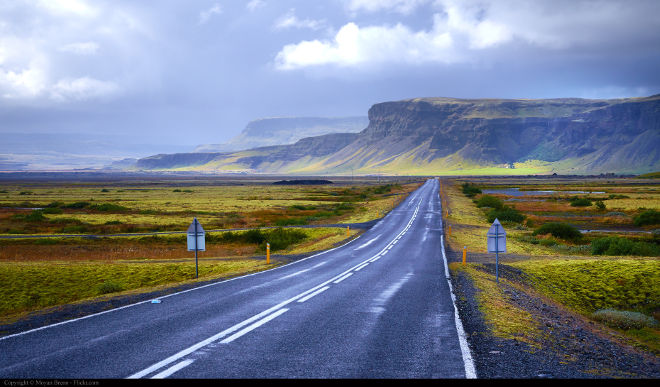
Photo by Moyan Brenn, under a Creative Commons license on Flickr
–
Alex Fisher is a high school teacher. Years ago he travelled the world, and wrote a little bit about it.
Feature image by Ravi Sarma, under a Creative Commons license on Flickr